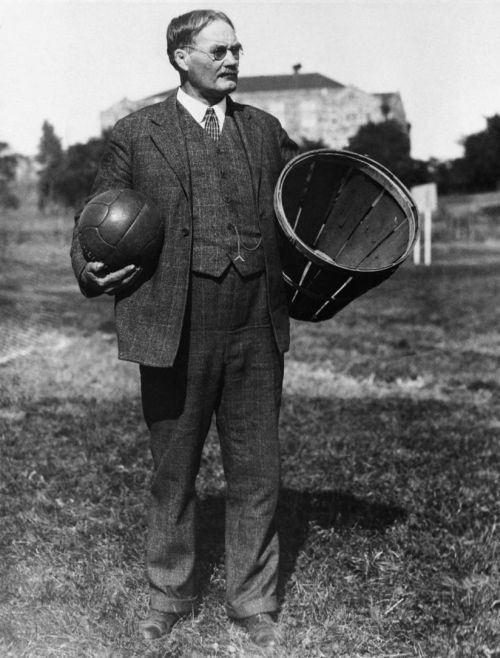 James NaismithWikimedia Commons [Public domain]The Olympics, an event where only the world's best athletes are permitted to compete on the highest level, features many sports including the widely popular basketball. This sport that is enjoyed by hundreds of millions of people, and that created some of America's most well-known celebrities, all started with none other than a man by the name of James Naismith. He did many other things besides inventing basketball, including publishing The Modern High School and The Basis of Clean Living ("James Naismith"). In addition to his accomplishments as a writer, Naismith "...became a beloved teacher at the University of Kansas, mentoring students who never picked up a basketball. He was much more interested in the role physical education played in the development of young people than in whether they were star athletes" (Rains). Although he had many accomplishments in his life, Naismith is remembered mainly as the inventor of basketball. However, he never let his invention stop him from pursuing other passions to help more people and share his knowledge with them. James Naismith is a hero because he devoted himself to multiple areas during his life and positively impacted other people's lives through his work.
James NaismithWikimedia Commons [Public domain]The Olympics, an event where only the world's best athletes are permitted to compete on the highest level, features many sports including the widely popular basketball. This sport that is enjoyed by hundreds of millions of people, and that created some of America's most well-known celebrities, all started with none other than a man by the name of James Naismith. He did many other things besides inventing basketball, including publishing The Modern High School and The Basis of Clean Living ("James Naismith"). In addition to his accomplishments as a writer, Naismith "...became a beloved teacher at the University of Kansas, mentoring students who never picked up a basketball. He was much more interested in the role physical education played in the development of young people than in whether they were star athletes" (Rains). Although he had many accomplishments in his life, Naismith is remembered mainly as the inventor of basketball. However, he never let his invention stop him from pursuing other passions to help more people and share his knowledge with them. James Naismith is a hero because he devoted himself to multiple areas during his life and positively impacted other people's lives through his work.
Through his hard work and devotion, Naismith accomplished what most would call impossible in more than one line of work. In Springfield, Massachusetts, Naismith was assigned a task to create an indoor game for the winter: "Two previous instructors had already become frustrated by the class and had asked to be replaced. Naismith had two weeks to complete his assignment. Initially he tried adopting childhood games and outdoor sports to suit the indoor playing area, but these proved unsuccessful. He realized that because of the space limitations, running must be kept to a minimum; and because of the hard floor surface, tackling and other rough play must be eliminated" (Jolly). There were many factors that contributed to the difficulty of his assignment which was supported by the fact that two other instructors had already given up. Despite this, Naismith continued to devote himself to the task at hand, and his hard work eventually gave birth to basketball. Because of the dedication he had for his job, Naismith accomplished what others gave up on, and created a sport that would eventually be enjoyed by people all around the world. In his later years, Naismith served in World War I as a chaplain: "Near the end of the war, Naismith wrote a letter to his wife, Maude, expressing concern about what was going to happen to all those young men when they returned home. He had an idea, he wrote, about what the government could do to help those men who had risked their lives for their country. In a few simple, handwritten pages, he drafted a plan similar to what would become the G.I. Bill -- at the end of the next world war" (Rains). Even though Naismith already accomplished so much in his life, he continued to do more for not only himself, but others as well. He did not come up with these ideas because it was his job, but rather due to his concern for the soldiers' return to regular society. Naismith devoted himself to his role in the war, and did all he could to help soldiers, resulting in more benefits for veterans through the G.I. Bill. Whether it be in a small gym or on the battlefield, Naismith always dedicated himself to his assignments by going above and beyond, helping others along the way.Naismith's inventive game and brave work on the battlefield affected countless people on an international scale. As part of his job at a YMCA location, Naismith came up with a new game: "Using a soccer ball and two peach baskets nailed to the ten-foot high balcony that served as an elevated track at the gymnasium, Naismith introduced the new game to his students. It was an immediate success. Within a decade, most major Canadian and U.S. cities had basketball leagues" (Jolly).
 YMCA, Chestnut Street, Springfield MAJohn Phelan [CC BY-SA 3.0 (https://creativecommons.org/licenses/by-sa/3.0)]Naismith's invention affected people everywhere in the world in many different ways. The sport can be enjoyed by either playing or watching others, which helped create the basketball leagues later on. Basketball provided a way for many people to benefit by playing as a professional and leading a successful life, or just by having fun. Following the creation and popularization of basketball, the sport continued to gain recognition, "And in 1936, I saw it played for the first time at the Olympic Games. And the whole thing started with a couple of peach baskets I put up in a little gym 48 years ago" ("On 1939"). Not only had Naismith's invention reached people all over the United States, but it was able to gain enough popularity to be an event in the Olympics. Something that started as a simple indoor game in a small gym, was able to become a sport where talented people from all around the world represented their countries through basketball. After his success with basketball, Naismith continued to pursue different things: "At 56, when the United States became involved in World War I, Naismith enlisted in the Army as a chaplain. He went to France and worked on the front lines, counseling young soldiers" (Rains). Naismith was able to reach others through not only basketball, but also on the battlefield during World War I. During harsh times in the war, he was able to help and care for soldiers who needed it. He did not let himself be satisfied with just one accomplishment but continued to strive for more, helping others along the way. Naismith had an impact on many people's lives by working passionately to achieve multiple goals and continue to aim higher.
YMCA, Chestnut Street, Springfield MAJohn Phelan [CC BY-SA 3.0 (https://creativecommons.org/licenses/by-sa/3.0)]Naismith's invention affected people everywhere in the world in many different ways. The sport can be enjoyed by either playing or watching others, which helped create the basketball leagues later on. Basketball provided a way for many people to benefit by playing as a professional and leading a successful life, or just by having fun. Following the creation and popularization of basketball, the sport continued to gain recognition, "And in 1936, I saw it played for the first time at the Olympic Games. And the whole thing started with a couple of peach baskets I put up in a little gym 48 years ago" ("On 1939"). Not only had Naismith's invention reached people all over the United States, but it was able to gain enough popularity to be an event in the Olympics. Something that started as a simple indoor game in a small gym, was able to become a sport where talented people from all around the world represented their countries through basketball. After his success with basketball, Naismith continued to pursue different things: "At 56, when the United States became involved in World War I, Naismith enlisted in the Army as a chaplain. He went to France and worked on the front lines, counseling young soldiers" (Rains). Naismith was able to reach others through not only basketball, but also on the battlefield during World War I. During harsh times in the war, he was able to help and care for soldiers who needed it. He did not let himself be satisfied with just one accomplishment but continued to strive for more, helping others along the way. Naismith had an impact on many people's lives by working passionately to achieve multiple goals and continue to aim higher.
The title of hero suits Naismith well because of his dedication towards his work, and the way he was able to affect others through his accomplishments. He was able to achieve as much as he did because of the fact that he was passionate about his work. His hard work also allowed him to reach people all around the world, and benefit them in various ways. Naismith is an inspiration to many people because of the impact he was able to leave through basketball: "He is honored by the Naismith Memorial Basketball Hall of Fame in Springfield. His original basketball rules were fewer than 600 words; today the rules contain more than 30,000 words" (Kansas Historical Society). A game that started with simple peach baskets evolved into a worldwide sensation, showing that anyone can accomplish a feat like this. Naismith's attitude towards his life can also be inspirational to others: "He was honored to be recognized for his invention because he believed it fulfilled a need for society, but it was not as if the sport became the measure of his life's work" (Rains). He was not satisfied with just inventing basketball, but also wanted to continue to fly higher. His actions send a strong message that people should never settle for the minimum requirements, but always aim for the top. Basketball has had a strong impact on my own life as well. It gave me something to work hard in and continue to improve myself while still enjoying the game. I also was able to learn from many experiences about the importance teamwork, dedication, and the feeling of defeat. Basketball has and will continue to leave immense marks on the world, and the root of the sport itself started with James Naismith.
Works Cited
"James Naismith." Encyclopedia of World Biography, vol. 21, Gale, 2001. Student Resources in
Context,link.galegroup.com/apps/doc/K1631007799/SUIC?u=powa9245&xid=13eb5e0d. Accessed 19 Jan. 2017.
JOLLY, J. CHRISTOPHER. "James Naismith." The Scribner Encyclopedia of American Lives,
Thematic Series: Sports Figures, edited by Arnold Markoe and Kenneth T. Jackson, Charles Scribner's Sons, 2002. Biography in Context, link.galegroup.com/apps/doc/K3436500425/BIC1?u=powa9245&xid=22485cfb. Accessed 12 Jan. 2017.
Kansas Historical Society. "James Naismith." Kansapedia, Jan. 2016,
https://www.kshs.org/kansapedia/james-naismith/12154.
"On 1939 Recording, Basketball Inventor Reminisces About First Game." Morning Edition, 16
Dec. 2015. Biography in Context, link.galegroup.com/apps/doc/A438472740/BIC1?u=powa9245&xid=c8ccd5a1. Accessed 17 Jan. 2017.
Rains, Rob. "Basketball was only a start." New York Times, 25 Oct. 2009, p. 9(L). Biography in
Context, link.galegroup.com/apps/doc/A210469272/BIC1?u=powa9245&xid=dc897655. Accessed 19 Jan. 2017.
Page created on 2/4/2017 12:00:00 AM
Last edited 9/19/2024 8:12:07 PM
